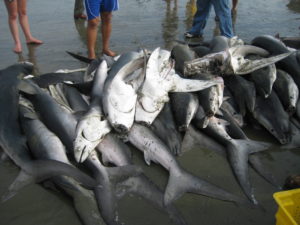On January 23, 2019, Reps. Gregorio Kilili Camacho Sablan (I-MP) and Michael McCaul (R-TX) introduced the Shark Fin Sales Elimination Act to ban the buying and selling of shark fins in the United States. Shark finning, the practice of cutting the fins off a shark and discarding its body at sea, is illegal in U.S. waters. However, trading, importing and exporting fins throughout the U.S. is still legal, including from countries that do not have adequate protections in place for their shark species.
The global shark fin trade is one of the largest contributors to the decline of shark populations around the world, with the fins from as many as 73 million sharks ending up in the market every year. Reps. Ed Royce (R-CA) and Sablan introduced similar legislation (H.R. 1456) in the 115th Congress, which gained 262 cosponsors in the House, including 11 committee chairs. Companion legislation overwhelmingly passed the Senate Commerce Committee; however, time ran out at the end of the year before Congress could pass the bill.

Finned blue sharks (David Jacobsen-Fried.Marine Photobank)
Oceana applauded the bill's re-introduction and released the following statement from campaign director Whitney Webber:
"Banning the U.S. shark fin trade has overwhelming support from the conservation, business and coastal recreation industries, and is a critical step for shark conservation. This legislation would improve enforcement of state fin bans and reinforce the status of the United States as a leader in shark conservation.
Rarely do we find an issue that can bring together the political, business and conservation communities as this bill. Eight in 10 Americans support a fin trade ban, as do many congressional leaders. This bipartisan legislation is a sensible, non-partisan way for the U.S. to lead in shark conservation. A national fin ban is something that both sides of the aisle can agree is good for our oceans, and good for the tourism jobs and businesses that depend on healthy shark populations.
Last year, we were just inches from the finish line in passing this bill. It's time to make a U.S. fin ban a reality. We commend Representatives Sablan and McCaul for their bipartisan leadership in re-introducing this legislation that will set a new standard for shark conservation.
Americans want the U.S. out of the shark fin trade. Twelve states have already passed shark fin bans, and now it is time for national action."
The bill currently has 51 bipartisan original cosponsors.
Below are statements from the bill's sponsors:
U.S. Rep. Gregorio Kilili Camacho Sablan:
"The strong, bipartisan support for this legislation sends a clear message that we have to pay more attention to protecting the Earth's oceans and the life within those oceans. Banning the sale of shark fins to help end this wasteful and cruel practice is important, but just a small step on the way to giving the oceans the full respect they must have in federal law. Ultimately, all life on Earth depends on the health of the oceans."
U.S. Rep. Michael McCaul:
"I am proud to help introduce the Shark Fin Sales Elimination Act, which builds upon existing federal law and state initiatives to ban the sale, purchase, or procession of shark fins in the United States. The gruesome shark-finning practices are decimating populations and putting many species on the brink of extinction. This sound bipartisan legislation will promote conservation and responsible fishing practices that are good for the environment and our economy.
"As the largest economy in the world, how we conduct our commerce has a profound impact on global markets and greatly influences others' economic behavior. It is long since time we leverage our economic might against shark-finning and work to counter the larger issue of animal poaching and the illicit trafficking of animal parts."
Background
The global shark fin trade has led to the brutal practice of shark finning, where the fins are removed and the bodies thrown back into the ocean, only to drown, starve or die a slow death. Some shark populations have declined by more than 90 percent in recent decades due to overfishing. One-third of identified shark species in the Hong Kong fin trade, the historic center of the global trade, are threatened with extinction.
In March 2017, Oceana released an independent report finding that shark-related dives in Florida generated more than $221 million in revenue and fueled over 3,700 jobs in 2016. This stands in stark contrast with the total U.S. shark fin export market (under $1 million in 2016).
Supporters of a shark fin ban include 12 U.S. states, 40 airlines, 20 shipping companies, seven major corporations and over 645 U.S. businesses and organizations. According to a 2016 national poll, 8 in 10 Americans support a national ban on the buying and selling of shark fins. Additionally, more than 150 scientists, 150 chefs and 85 surfers and surf businesses have sent letters to Congress urging the passage of a national shark fin ban.
Read more here.
Oceana is the largest international advocacy organization dedicated solely to ocean conservation. Oceana is rebuilding abundant and biodiverse oceans by winning science-based policies in countries that control one third of the world's wild fish catch. With more than 200 victories that stop overfishing, habitat destruction, pollution and killing of threatened species like turtles and sharks, Oceana's campaigns are delivering results. A restored ocean means that one billion people can enjoy a healthy seafood meal, every day, forever. Together, we can save the oceans and help feed the world. Visit usa.oceana.org to learn more.
The post 116th Congress Introduces Bill to Ban U.S. Shark Fin Trade appeared first on Scuba Diver Life.
from Scuba Diver Life http://bit.ly/2AZrsaD
No comments:
Post a Comment